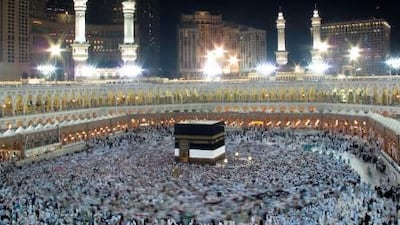AJMAN // As Haj tour operators compete to provide the greatest luxury, pilgrims say packages costing more than Dh100,000 detract from what should be a religious experience.
Even an "ordinary" Haj package can cost between Dh39,000 and Dh45,000, including airfare and accommodation. But the tour operators say they are only providing what customers want - and some want luxury.
MORE ON THE HAJ
Haj pilgrims to require meningitis vaccine Haj and Umra applicants must have a valid vaccination against meningitis, the Ministry of Health has ruled. Read article
Saudi Arabia gears up for Haj An estimated 2.7 miillion religious tourists are expected to visit Saudi Arabia's holiest cities for this year's Haj pilgrimage. Read article
Sharjah pilgrim's journey changes his life Since his first pilgrimage in 2008, the businessman has made the Haj an annual event, saying his personal and business relationships have improved from a clarity of spirit he attained there. Read article
"A number of pilgrims want to stay near the holy places like the Kaaba, and hotels in the neighbourhood are more expensive," said Shaban Abdul Maqsood, who works at a tour company he declined to name.
"We offer a 'five-star' Haj and have our pilgrims residing in a five-star hotel near Kaaba. In Mina, they would stay at another good hotel overlooking the stoning area, and in Medina they would stay in another five-star hotel near the holy mosque … all packaged at Dh80,000."
Ibrahim Abdullah, a businessman in Ajman who is doing his Haj this year, said the prices were too high.
"I know the Haj operators are really offering excellent services but this is a religious activity," Mr Abdullah said. "They should make it accessible to even the low-income earners."
Ahmed Al Bayat, who will also do the pilgrimage this year, said he had paid for the ordinary Haj package even though he could afford other categories, as he wanted to be with ordinary people.
"The problem with these categories is that they are dividing between the rich and poor in a religious duty where we are supposed to be equal," Mr Al Bayat said. "I have earlier tried some other categories but realised the best memories of a Haj would be derived from being with the ordinary people, talking to them about their lives and challenges."
Mr Maqsood said even his company's "quick" and "ordinary" Haj packages provided accommodation in a four-star hotel in Mecca.
"Some people would complain we are pricing so high but look at the services we are offering," he said. "They are excellent and the prices are worth each category."
The prices do keep some people away. Yahya Ali, a marketing manager of Abu Saif for Haj and Umrah Tours, said some Haj tour operators have had no one applying for VIP or five-star packages this year.
"We have in the past had these two prestigious categories and only make arrangements for someone who has applied," Mr Ali said.
"We always give all categories good services, like our quick and ordinary Haj's stay in Grand Zam Zam Hotel in Mecca and Grand Zam Zam Hotel in Medina, both five-star."
The prices were not regulated by the Government, said Obeid Al Zaabi, the director general of the General Authority of Islamic Affairs & Endowments in Ajman.
"As regards the categorisation of services, this is for only outside services like hotel or flights," Mr Al Zaabi said. "All people are equal in places of worship and at the Kaaba and no such categorisation is there."
In Umm Al Qaiwain, Ali Hamid said he had performed Haj last year and paid Dh18,000, which involved sharing a hotel room with three other people and using bus transport. He said he found the journey a tremendous experience.
"I knew of some of my other colleagues that stayed more than four in a room after paying the same fee as myself," Mr Hamid said.
"The problem is all tour operators are just concerned with making profits. We paid the least money but still they spent on us less than half of what we paid."
Abdullah Khalwaj, another UAQ resident, said he had been saving for five years to go to Haj. Every year he thinks he has enough money but finds prices have gone up.
"I don't know what should be my target in saving, as every year brings new figures," Mr Khalwaj said. "Gone are the days when our grandparents saved for years to make Haj and lived to see their dreams coming true.
"Our world is different and very hostile when it comes to making profits … even religious duties are not spared of this greed."

